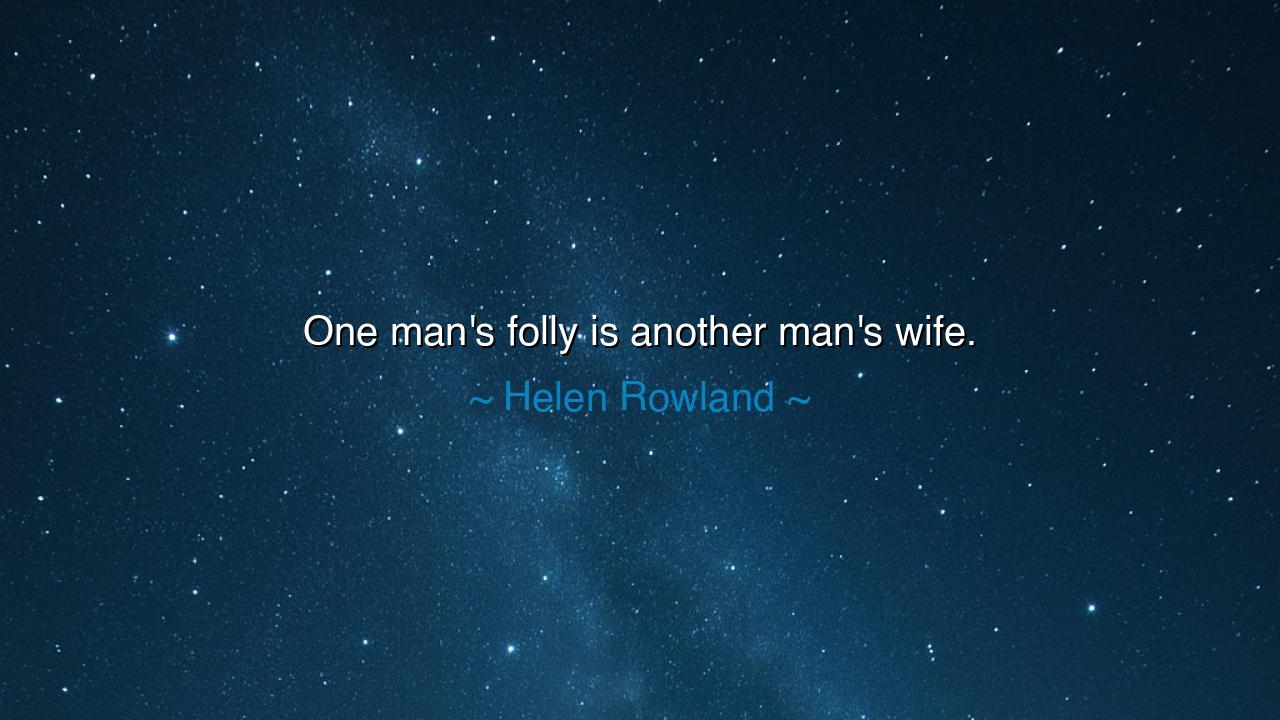
One man's folly is another man's wife.






In the tapestry of human relationships, where love, pride, and folly often intertwine, there are truths that seem to transcend time—truths that laugh at the human condition and its contradictions. Helen Rowland, with her sharp and irreverent wit, once quipped, “One man’s folly is another man’s wife.” These words, though humorous in tone, carry with them a profound commentary on the nature of relationships, perception, and the complex dance between desire, choice, and fate. At first glance, this statement might seem like a playful jab at marriage and the choices we make in life, but beneath the humor lies an ancient truth—that what one person deems as a mistake, another may see as a treasure.
In the ancient world, the concept of fate and destiny often shaped the lives of men and women, binding them to roles and expectations that they could neither easily escape nor fully understand. The Greeks, with their rich mythology, often depicted the ways in which love and folly intertwine, leading individuals down paths they had not chosen for themselves. Take, for instance, the story of Paris and Helen of Troy—two figures whose love was marked not by wisdom, but by passion and pride. What was Paris’s folly—to abduct Helen—was seen by him as a great act of love, while for Menelaus, it was a betrayal, a loss that would set the world ablaze. Yet, in the grand tapestry of war and love, the same act carried vastly different meanings for different people. Rowland’s quote encapsulates this very truth: that what one man sees as folly, another sees as a prize, depending on the lens through which they view the world.
Consider the tale of Cleopatra and Julius Caesar. Their union, born of political necessity and personal desire, was seen as a folly by many, as Cleopatra was an outsider to Roman traditions, and their love threatened the stability of the Roman Republic. Yet, for Caesar, Cleopatra was no folly—she was a powerful ally, a woman of intelligence, grace, and ambition. The love they shared became a key element in the shifting tides of Roman power. To Cleopatra, their relationship was not a foolish act, but a strategic move in her long-standing battle for Egyptian dominance. Just as Rowland’s words suggest, the same relationship, viewed from different perspectives, became a symbol of greatness and folly simultaneously.
The ancient Romans themselves often viewed marriage and relationships through the lens of utility and fate. The story of Rome’s founding is built upon the kidnapping of the Sabine women, an act of violence that was turned into a symbol of union between warring tribes. What was once an act of folly—a brutal abduction—became the cornerstone of a new society. In a similar way, the choice of a life partner is often viewed through the lens of opportunity rather than romantic idealism. One person may see their spouse as a mistake, an unwanted consequence, while another person may see them as the key to their life’s meaning, growth, or stability. This paradox speaks to the fluidity of human perception, and the subjective nature of what is seen as folly or wisdom.
Rowland’s humorous insight also speaks to the inherent mystery of human relationships. In the ancient world, love and marriage were not always bound by the traditional notions of affection and compatibility. Consider the marriage of King Solomon to the Queen of Sheba, which was not built solely on love but on political alliance and mutual respect. What may have seemed like a transactional union to some, was viewed by others as a strategic and wise move—one that shaped the future of the kingdom and brought about a lasting legacy. Thus, Rowland’s words remind us that marriage and relationship choices are often not about the emotion of the moment but the practicality and long-term consequences of those choices. What one may view as unwise, another may see as the only way forward.
The lesson in Rowland’s words is one of perspective and understanding. In relationships, we must recognize that our judgments are often colored by our experiences, desires, and expectations. What one person perceives as foolish, another may see as sacred or necessary. It is a reminder that love, marriage, and partnerships are not always as simple as they may seem on the surface, and what may appear as folly in one light can, over time, reveal its true value. This understanding calls for humility, for the recognition that judgments made in haste or without full understanding are often misguided.
In our own lives, we must learn to approach our relationships with a spirit of openness and understanding. Just as the ancients sought wisdom from their relationships—seeing them as reflections of society, power, and fate—we must approach our partners with the same depth of reflection. Every relationship has its joys and challenges, but it is through these that we find the true meaning of companionship. Let us not be quick to dismiss the choices of others, for what may seem like folly today may become the foundation of a lasting union tomorrow. As Rowland’s words remind us, life’s greatest truths often come not from the surface, but from the deeper understanding of the complex forces that shape our human connections.






AAdministratorAdministrator
Welcome, honored guests. Please leave a comment, we will respond soon